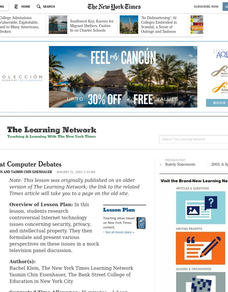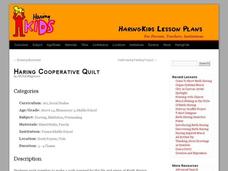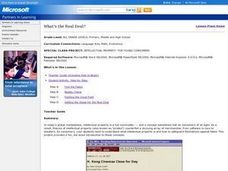Curated OER
Tracking down Good Information on the Web
Fifth graders brainstorm on whiteboard Web authorship and what they think they need to know about information on a website in order to judge its content. They research the solar system websites and present them to the class with their...
Curated OER
Current Events Research
Students use one newspaper article and the internet to research their current event. Using the information, they write a summary and create a PowerPoint presention. To end the lesson, they share their research with the class and discuss.
Curated OER
The Western Hemisphere on Review
Sixth graders research a country in the Western Hemisphere. They write a research paper and present a five-minute presentation on the country. They use PowerPoint to give their presentations to the class.
Curated OER
Storming the Web
Learners explore the importance of weather prediction and the Internet's role in changing the way weather is reported. By participating in an Internet scavenger hunt, students appreciate the role weather prediction through the Internet...
Curated OER
The Great Computer Debates
Students research controversial Internet technology issues concerning security, privacy, and intellectual property. They formulate and present various perspectives on these issues in a mock television panel discussion.
Curated OER
It's About Time!
Young scholars examine the potentials, both positive and negative, of adapting an international 'Internet time' system. They create and solve word problems that require them to translate between the current time system and Internet time.
Curated OER
Dot-Gone
Students read "Failed Web Sites Live On, Gone but Not Forgotten." students examine why some Internet businesses have failed and develop business models for successful new Internet companies.
Curated OER
Media Literacy
Students evaluate the effectiveness of Internet book clubs, present their findings to the class, and design their own on-line book club (under the umbrella of a fictional television program) to encourage non-readers to read more.
Curated OER
Searching the Net
Students create a Native American Nation flip book. In this Native American lesson, students choose one of four Native American Nations: The Iroquois, Hopi, Seminoles, Sioux. They research them on the Internet using teacher given...
Curated OER
Mammal's Around the World
Fifth graders, exploring all the ins and outs of using a computer, publish their own mammal papers with the use of word searches, thesaurus and spell checks. While in the computer lab, they research their mammal and country on the...
Curated OER
Haring Cooperative Quilt
Students inspect visual arts by examining images on the web. For this art history lesson, students discuss the history of art after researching Keith Haring's work on the Internet. Students analyze the style of...
Curated OER
What's the Real Deal?
Students investigate product counterfeiting and its impact on the US economy. They research product counterfeiting on the Internet then create a "fakes" fact sheet about a specific group of products such as music cods or beanie babies.
Curated OER
Freedoms We Enjoy
Young scholars compare lifestyles of the United States to another foreign country. In this social studies lesson, students use the information they previously researched on the Internet and publish a PowerPoint presentation to illustrate...
Curated OER
eNews@Jefferson Elementry
Fifth graders write news reports from their school to publish on their website. They use graphic organizers to collect their data in an orderly fashion. The class works as a whole to produce the website.
Curated OER
The First (and Last) Words
What does "freedom of speech" mean to your class, especially in the context of Internet communications? In round-table discussion format, middle and high schoolers address the issues discussed in "State Legislatures Across U.S. Plan to...
Curated OER
Searching for Answers
How does a judge in the federal judicial court decide on a verdict? Give your middle and high schoolers a better idea of how final decisions are made in the judicial system. Then split your class into four groups, assigning each group a...
Curated OER
Arti-Factual Evidence
Practice responding to controversial information with the New York Times lesson provided here. Middle schoolers watch a video interview with the director of The Lost Tomb of Jesus. After reading a companion article, they identify...
Curated OER
Cloning Around
Review concepts of cloning and genetic engineering and participate in a round-table discussion based on the ethics and potential of cloning with your class. Each learner then writes a formal essay on the topic, stemming from the debate.
Curated OER
Replacing Missing Links in the Evolutionary Chain
Examine the evolution of various species of hominids from their earliest existence approximately 4.5 million years ago to today. In small groups, learners research one of the ten stages of hominid evolution and then create a poster and...
Curated OER
Heeding Advice
Compare and contrast various foreign perspectives on the George W. Bush administration's plans for military action. Middle schoolers read the article "Blair and Chirac Head to U.S. to Talks and a Show of Unity." Then, they analyze...
Curated OER
Covering the Issue
Examine how art and music can be powerful tools for conveying a political or social message. After considering the issues surrounding rapper Paris, students design their own album covers that reflect their political and/or social...
Curated OER
Active Reading with American History
Explore connections within and between informational texts with this lesson about encyclopedia articles. Middle schoolers write encyclopedia articles focusing on topics in American history. They discuss how to determine credibility...
Curated OER
Health Conscious?
What is your attitude on health and illness? By considering their own experiences, learners will reflect on and discuss their attitudes toward health and illness while educating each other by researching illnesses in small groups,...
Curated OER
What a Relief!
How are disasters addressed by the Federal Government? This New York Times instructional activity, based on the article "Disaster Aid: The Mix of Mercy and Politics," prompts middle schoolers to discuss the idea of using a disaster...























